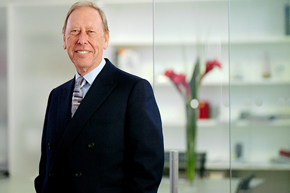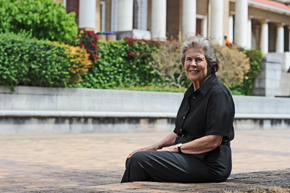Honorary doctorates for Burton, Potter
12 December 2011December's recipients of honorary doctorates are no strangers to UCT. Mary Burton, though better known for her long association with human-rights organisation the Black Sash, is a familiar face around campus, whether serving on UCT Council or attending or speaking at a university meeting. In turn, Dr David Potter, celebrated for his achievements as an inventor and entrepreneur, is a well-known name among the university's postgraduates for the David and Elaine Potter Fellowships, which he and his wife established through their David and Elaine Potter Foundation.
 |
 |
| Illustrious company: This week Dr David Potter and Mary Burton become the latest recipients of honorary doctorates from UCT. | |
Mary Burton was born in Buenos Aires, Argentina, in 1940. In 1961, she moved from Argentina to South Africa. Aghast at the country's political situation, she took just four years to join the Black Sash. Over the subsequent decades, she was involved first in the struggle for human rights in South Africa, then in national reconciliation in the post-apartheid era. She was president of the Black Sash from 1986 to 1990, among her many other roles in the organisation. She also served on the Truth and Reconciliation Commission as a commissioner on the Human Rights Violations Committee, from 1995 to 1998. In addition, she's been involved with organisations such as the Surplus Peoples Project, the National Council of Women, the Civil Rights League and the South African Institute of Race Relations.
Burton also served two terms on UCT Council, including as deputy chair from 1999 to 2005. In 2000 she helped launch the Home for All Campaign, which called on white South Africans to contribute to reconciliation in recognition of the benefit and privilege they had had under apartheid. In 2003, she received the Order of Luthuli (Silver) from President Thabo Mbeki. The following year she was presented with the Western Cape's highest award, the Order of Disa, and the Reconciliation Award, conferred by the Institute for Justice and Reconciliation.
Somewhere among all her activities, Burton also made time to finish a BA degree in 1982, with majors in four subjects - political science, social anthropology, comparative African government and law, and English. "Although I had been very active in the Black Sash, I felt the need for a better historical and theoretical understanding of apartheid, and of politics in general," she says of her decision to register here. She wanted to continue her studies, but never did, as the political troubles in the country kicked into high gear in the 1980s. But on 12 December, Burton will finally receive a higher honour when UCT presents her with an honorary doctorate in social science.
Dr David Potter has been hailed as a great inventor and entrepreneur, but also as a philanthropist, especially one who has supported higher education in South Africa. He has also channelled some of the fruits of his success into supporting projects in education, research and Third World development. Born in East London in 1943 but brought up in Rondebosch, Potter was awarded a Commonwealth Scholarship to study for a doctorate in mathematical physics at Imperial College, London. He worked as an academic in the 1970s, teaching at the University of London and the University of California.
Then in 1980 he founded the software company Psion, which stands for Potter Scientific Instruments or Nothing - so named, it is said, to mark his formal retirement from academia (and which may explain why some have described him as an "eccentric"). Psion's first real success was with a flight simulation game, but more importantly, the company led the creation of the Organiser, Palmtop and PDA markets as a new market segment. Potter later founded Symbian Limited, which worked in partnership with Nokia, Ericsson, Motorola and Matsushita to create Symbian, the operating-system standard for mobile wireless devices. In the 1997 UK New Year's Honours list Potter was named a Commander of the Order of the British Empire for services to the manufacturing industry. In 2001 he was elected a Fellow of the Royal Academy of Engineers.
Potter's ties with South Africa remain. So, for example, he serves on the South African President's Committee on Communication and Information Technology. Potter is the spouse of journalist and writer Elaine Potter, also born in South Africa. He has deep roots at UCT - his grandfather, Alfred Snape, was appointed professor of civil engineering at the South African College (SAC), which would become UCT a few years later, in 1910; and his grandmother was an early graduate of the SAC. Now the Potters support the university through the fellowship programme they established here through the David and Elaine Potter Foundation, giving an opportunity to motivated and academically excellent individuals to use their education for the betterment of South Africa and civil society. So far more than 40 master's and doctoral students have been supported through this initiative. "With [my personal and academic] background it is evident that I have a profound belief in the importance of education and its role in economic welfare and upliftment from poverty and dispossession," Potter says. "I am glad that I have been able to create the Potter Fellowships, to be involved with so many gifted young people and to maintain the family's linkage to UCT." Potter will be awarded an honorary doctorate in engineering science on 13 December.
 This work is licensed under a Creative Commons Attribution-NoDerivatives 4.0 International License.
This work is licensed under a Creative Commons Attribution-NoDerivatives 4.0 International License.
Please view the republishing articles page for more information.







